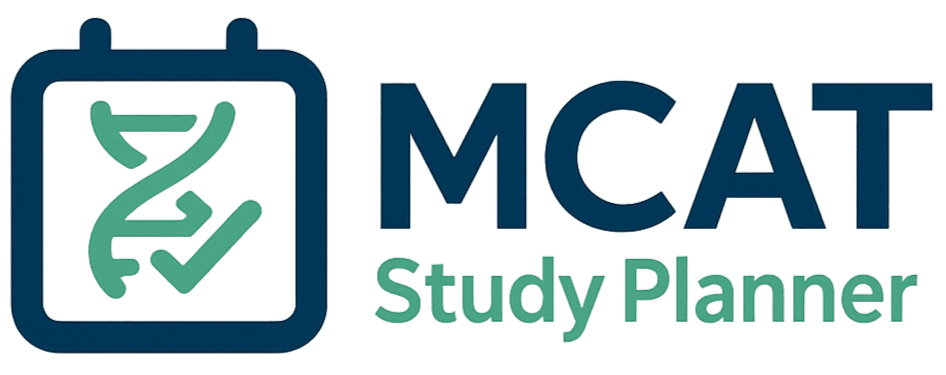Best Anki Decks for MCAT in 2025
By Dr. Sarah Johnson • Updated 10/6/2025
Struggling to remember everything for the MCAT?
Smart students use Anki flashcard decks for efficient review.
Here’s our round-up of the best Anki decks for MCAT that high scorers swear by.
Quick Summary:
-
MileDown Deck: Best for students who want a balance between depth and manageability. Ideal for starting with a well‑structured deck that has good organization and multimedia support.
-
JackSparrow2048 Deck: Best for learners who want deep, challenging content with detailed explanations and practice problems. Ideal for those who want thorough review, and are comfortable editing/filtering cards.
-
Mr. Pankow Deck: Best for students seeking to boost their Psych/Soc scores with focused, in-depth study for that particular section.
-
Aidan Deck: Best for highly dedicated, advanced students who want exhaustive review, and are comfortable managing a very large, complex deck.
-
Ortho528 Deck: Best for students who want more depth than MileDown but still want a straightforward, organized deck that’s easy to complete. Ideal for learners who are comfortable using tags to navigate content
-
AnKing Deck: Best for students who want an “all-in-one” deck that is well supported, updated, and flexible. Good for those who prefer an integrated resource over juggling multiple decks.
-
Bouras Deck: Best for students who want maximum depth from a comprehensive, well-curated, and detailed deck, but with a steep learning curve. Advanced students aiming for top-tier scores might find its breadth beneficial.
Best Anki Decks For MCAT Reviewed
1. MileDown MCAT Anki Deck
The MileDown Anki deck is a well-regarded MCAT study resource known for its concise and organized coverage of high-yield MCAT content.
It includes around 2,900 cards categorized into 7 sub-decks and further tagged by subtopics, allowing users to create custom decks targeting specific study areas.
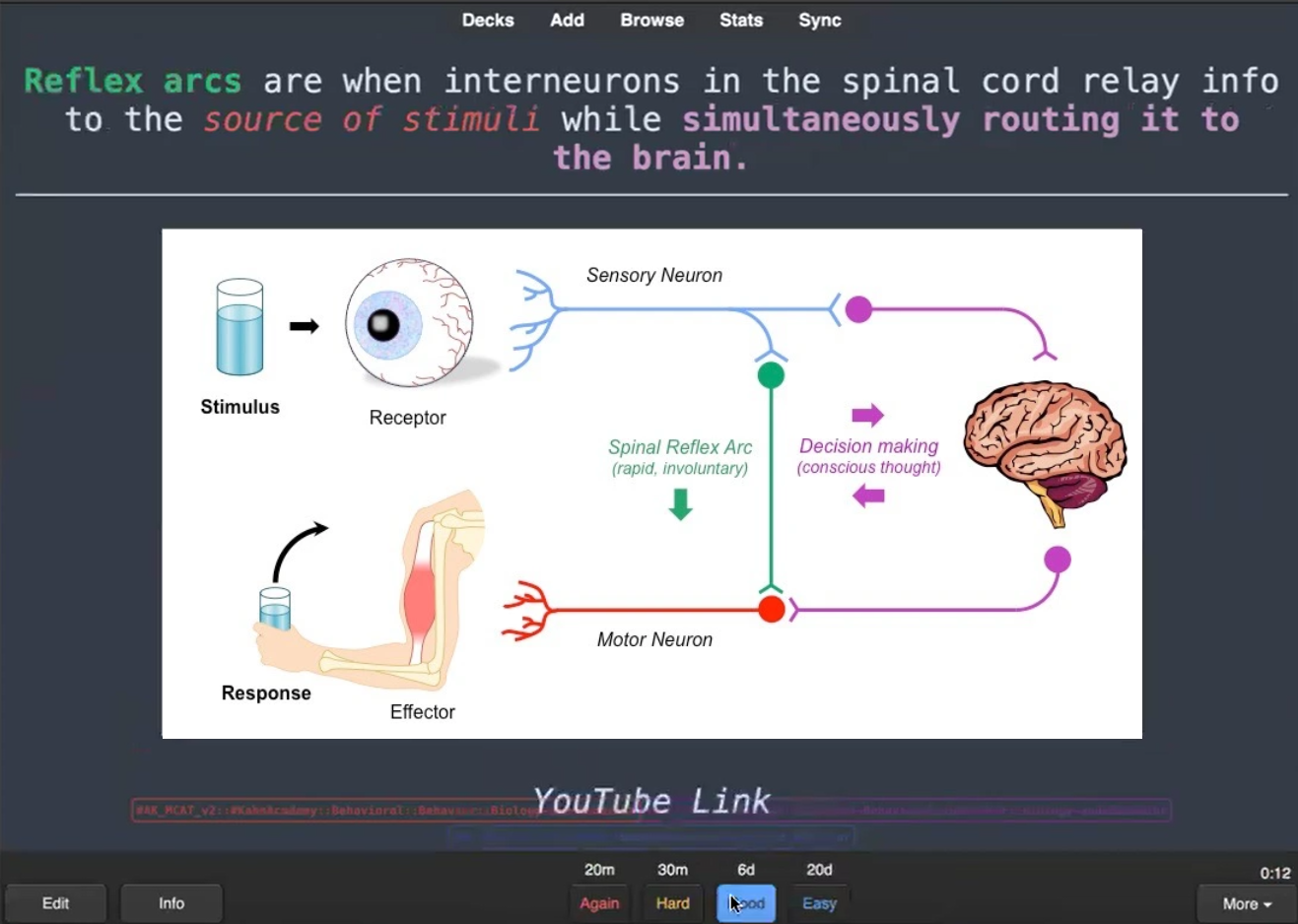
The sub-decks are essentially grouped as per the major MCAT subjects (Behavioral, Biochemistry, Biology, General Chemistry, Organic Chemistry, Physics/Math, and Essential Equations).
Every card is well-formatted, complete with:
-
Clean cloze-style (fill‑in‑the‑blank) questions to encourage active recall.
-
An accompanying image.
-
A link to the relevant Khan Academy or YouTube videos, providing easy access to detailed explanations that aid in reviewing difficult concepts. For a comprehensive list of free MCAT resources including Khan Academy and more, see our guide to the best free MCAT resources.
This free deck covers virtually all the high-yield MCAT content across all sections. It also has built-in coverage of all required equations, units, and constants for the MCAT.
It is directly aligned with AAMC practice material and is popular for its visual aids and clarity.
Overall, the MileDown Anki deck is praised for its solid organization, card quality, and balance between comprehensiveness and manageability, making it an excellent choice for most MCAT students seeking a reliable starting point without being overwhelmed by excessive details.
Who it’s for: Pre-meds on a moderate timeline who want a solid, visual review. If you like images and want a deck that hits the essentials without excess bulk, MileDown is a smart choice.
Pros
-
Concise and well-organized, making it easy to review high-yield MCAT content efficiently.
-
Good coverage of high‑yield content without too much fluff.
-
Integration of helpful multimedia for deeper conceptual understanding
-
The manageable card volume hits a good balance between thoroughness and feasibility.
-
Allows sorting and targeting specific weak areas by topic, enhancing focused study.
Cons
-
Some advanced or low‑yield content may be under‑covered.
-
It’s an older deck, so some content may be missing, outdated, or erroneous.
2. JackSparrow2048 MCAT Anki Deck
The JackSparrow2048 MCAT Anki deck is a highly comprehensive and content-rich resource created by a user who reportedly scored a 527 on the MCAT.
It contains approximately 6,000 cards, making it one of the most detailed free decks available.
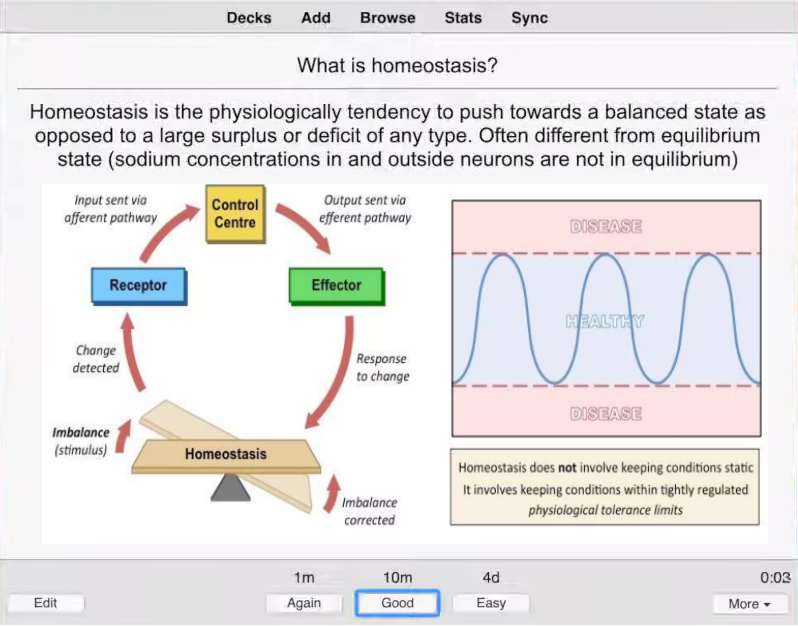
The deck aligns well with Kaplan materials and covers every single MCAT topic thoroughly, including foundational concepts as well as challenging cards that require critical thinking.
It also contains some practice problems and detailed explanations, which make this deck suitable for advanced MCAT students aiming for scores above 515.
It is worth noting that this deck was originally designed for personal use and was never intended for public release. So, it may contain spelling errors and some rough edges (uneven formatting, uneven tagging, some conceptual mistakes, etc.)
The JackSparrow2048 deck tends to be slow and content-heavy, demanding a significant time commitment for effective study. Cards are organized by Kaplan chapters or by sections from Khan Academy documents, with some decks still being updated and reorganized.
Unlike MileDown’s cloze cards, this Anki deck uses simple front/back cards with long explanations on the back, essentially turning the deck into a mini-textbook.
Cards are grouped by subject, and some of the content is even borrowed from or based on other popular MCAT decks like Cubene’s for Psych/Soc and RebopBebop’s for sciences.
Overall, the JackSparrow2048 Anki deck is best for dedicated students with a longer prep timeline who want a deep and exhaustive review, but it might be slow and overwhelming for beginners or those seeking more streamlined materials.
This deck particularly outperforms in the dense, content-heavy science areas, making it a solid study resource for the science sections (Bio/Biochem & Chem/Phys).
Who it’s for: Students who truly enjoy dense detail and textbook-like learning for deeper conceptual understanding. If you’re preparing early with lots of time and you love reading long explanations, JackSparrow2048’s deck will reward you with coverage.
Pros
-
Extremely comprehensive and detailed, covering all MCAT sections thoroughly.
-
Contains challenging cards that require deep conceptual understanding and critical thinking.
-
Aligns well with Kaplan materials and broadly covers content, including core content and low-yield topics.
-
Content‑heavy cards with rich explanations and context help with deeper conceptual understanding rather than surface recall.
-
Because the deck is “raw” and somewhat modular, users can suspend cards, filter by section, or tailor usage to their own pace and priorities.
Cons
-
Working through the large deck can be overwhelming and time‑intensive.
-
May cover some material that is rarely tested, making it less efficient for effective content review.
3. Mr. Pankow Psych/Soc MCAT Anki Deck
The Mr. Pankow MCAT Anki deck is highly regarded as one of the best resources specifically for the Psychology and Sociology (P/S) section of the MCAT.
Unlike MileDown or JackSparrow2048 which cover all MCAT topics, Mr Pankow’s deck is solely for Psychology and Sociology.
It contains around 2,200 cards with thorough coverage, including niche topics like brain anatomy and behavioral science principles such as Cialdini’s persuasion techniques.
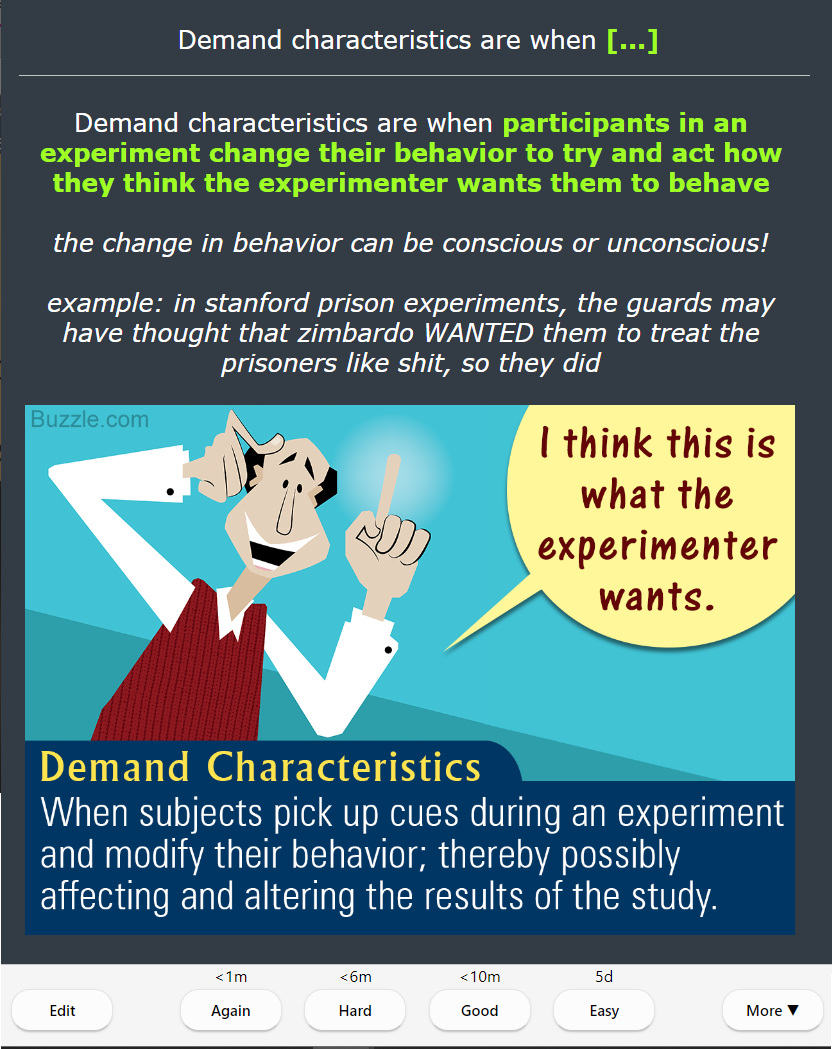
Every card comes with detailed explanations or examples. This deck has real examples (not just definitions), nuance, and applied content, which helps with retention and understanding. It doesn’t just quiz definitions - it teaches concepts.
The deck is organized by Khan Academy’s P/S review blocks or the AAMC Psychology/Sociology framework, which helps match the MCAT’s tested themes.
Many users credit Mr. Pankow’s deck for noticeable score improvements in the P/S section, sometimes increasing scores by 5 points or more.
The deck is praised for detailed explanations that help deepen understanding. Though it may include some low-yield content, the depth prepares students well for more challenging questions on the actual exam.
In recent years, Mr. Pankow’s content has been integrated into the more comprehensive AnKing MCAT deck - i.e., many P/S cards originally from his deck are now folded into that composite deck, which includes better formatting and resource links.
Overall, this deep, well-crafted MCAT Anki deck is ideal for students looking to excel in the Psych/Soc section and is often recommended as a supplement or alternative to broader MCAT decks for targeted review.
Who it’s for: Anyone targeting a high Psych/Soc score and willing to put in the hours. If your Psych/Soc score is lagging and you have months to prep, this deck is top-tier.
Pros
-
Highly detailed and thorough, with strong Psych/Soc focus & depth.
-
Good alignment with AAMC & Khan Academy official resources.
-
Comprehensive coverage of most (if not all) high‑yield P/S terms, theories, and components.
-
Covers niche and advanced topics, which can boost understanding and scores.
-
Higher retention & better intuitiveness due to the cards often framing definitions in context or examples.
Cons
-
Contains some low-yield content that may not be essential for all test-takers.
-
Can be overwhelming due to the volume of cards and depth of content.
4. Aidan MCAT Anki Deck
The Aidan MCAT Anki Deck is an extremely comprehensive and detailed resource, containing over 15,000 cards that cover all MCAT subjects.
This deck pulls content from a wide range of high-quality sources, such as Kaplan books, Khan Academy P/S notes, UWorld, Altius FLs, and Blueprint’s Qbank, making it ideal for filling content gaps identified during practice.
It is organized chronologically, often following Kaplan chapters, which helps with systematic review.
The deck is mostly in cloze deletion format, with a focus on tagging and structure to help filter or navigate.
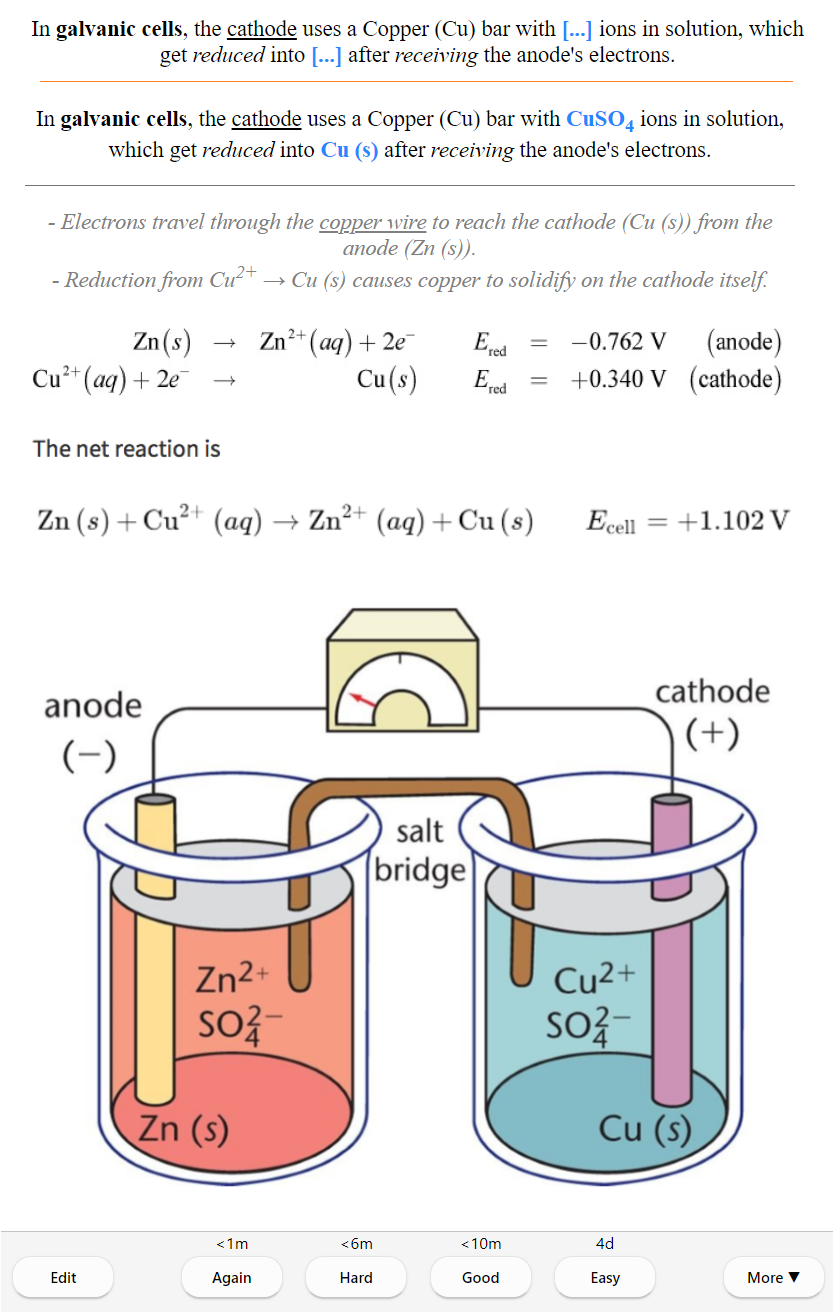
On the downside, the deck is very large and can be overwhelming for average users.
It includes many duplicate cards created intentionally to promote active recall, but can increase study time. Additionally, there are numerous low-yield cards, attributed to the creator’s extended study timeline, which incorporated a lot of content beyond core MCAT essentials.
Some card mistakes and errors have been acknowledged by the creator, who is actively working on refining and reducing duplicates.
Overall, Aidan’s deck is best suited for students who want a highly detailed, thorough resource to drill deeply into weak areas, but it can be quite time-consuming and may not be as streamlined as other popular decks.
Who it’s for: Primarily, this deck is for the very ambitious or for late-stage review. If you already have core knowledge but want an encyclopedic repository, it can plug gaps. Pros
-
Extremely comprehensive, covering all MCAT subjects in depth.
-
Includes content from trusted sources like Kaplan, Khan Academy, UWorld, and Blueprint.
-
Great for drilling and filling content gaps identified during practice tests.
-
Some cards (especially in Bio/Biochem) are praised as “cheat‑code” level detail.
-
Ordered to align with Kaplan’s content progression.
Cons
-
The overwhelming size is impractical for full completion within a typical MCAT prep timeline.
-
Time spent working through this deck might detract from doing practice problems, full tests, or refining test strategy.
5. Ortho528 MCAT Anki Deck
The Ortho528 Anki deck is a popular and well-regarded MCAT deck created by a student who scored 132 on all content sections of the MCAT.
It contains around 4,300 cloze deletion cards, making it a fairly detailed resource for MCAT preparation. The deck incorporates images and diagrams to enhance visual learning.
This deck covers all MCAT sections with tagged cards for convenient filtering by topic or section. However, the cards have limited explanations, which might make the deck less useful for those wanting a deep, conceptual understanding of material.
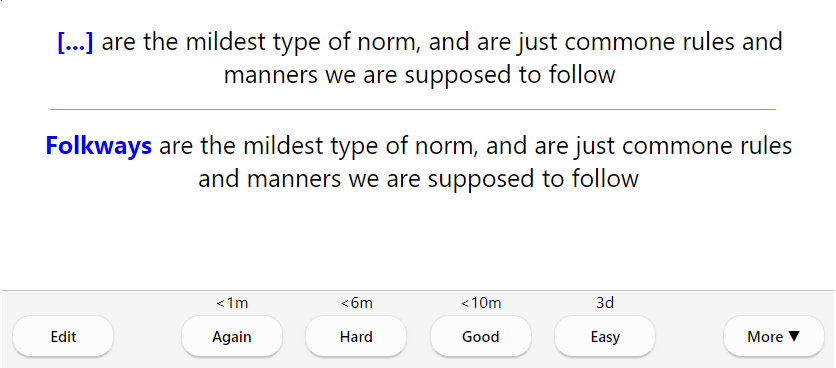
Overall, the Ortho528 MCAT Anki deck is praised for clarity, inclusion of visual aids, and manageable size. However, it may not be sufficient alone for deep understanding or advanced scoring strategies.
Who it’s for: Great for beginners who want a solid, straightforward deck to start with, or those seeking an efficient resource with moderate detail.
Pros
-
Has decent foundational coverage.
-
Well-organized with tagged cards by MCAT sections and topics for easy filtering.
-
Cloze deletion format helps to simplify review and speed up recall.
-
Many cards include images and diagrams, helping with visual learning.
-
Covers all MCAT content sections with moderate depth.
Cons
-
Sparse explanations on cards may hinder deep conceptual understanding.
-
No subdeck organization, which means that segmenting study time may be more cumbersome.
6. AnKing MCAT Anki Deck
The AnKing MCAT Anki deck is widely regarded as one of the best and most comprehensive MCAT Anki decks available.
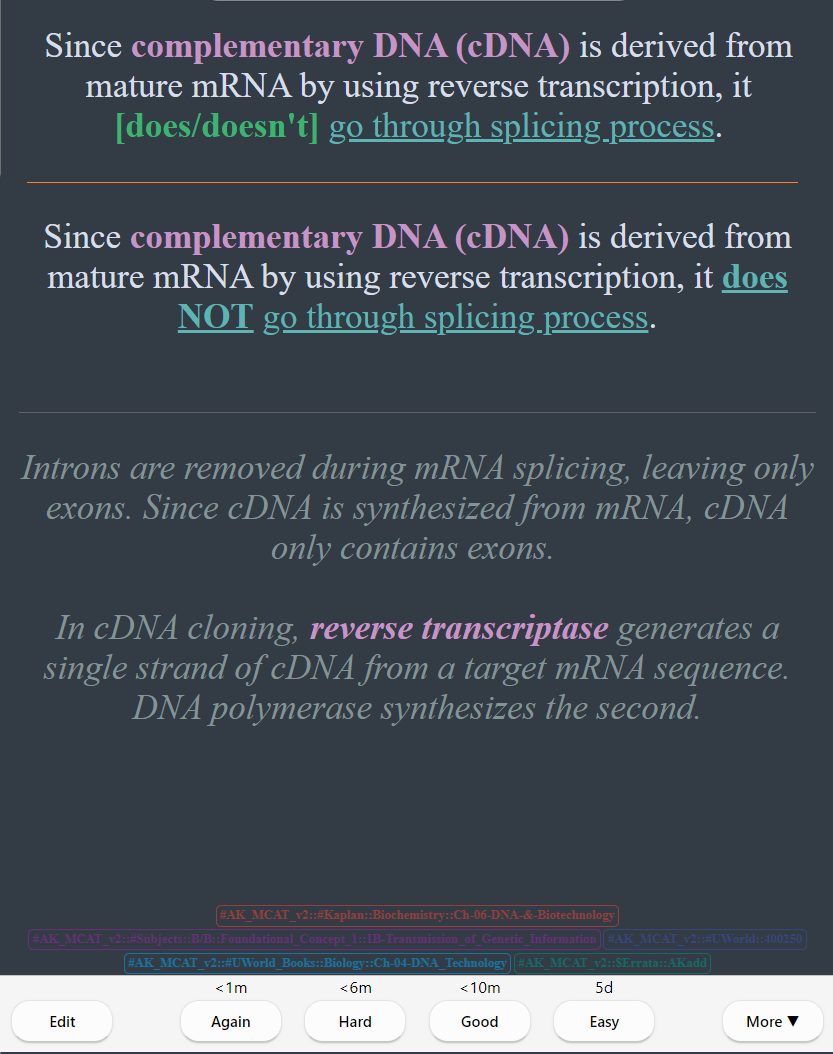
This deck is a “composite” or integrative deck that builds on & merges content from several popular MCAT Anki decks (including MileDown, Mr. Pankow, Abdullah, and Coffin). It is continuously updated, adding new content, updates, and tags.
The deck is hosted on AnkiHub, a collaborative platform that allows deck creators, contributors, and users to propose edits, updates, and fixes to keep the content current. These real-time updates and community contributions ensure students study from the latest available material.
Key features of the AnKing deck include:
-
Comprehensive coverage of all MCAT subjects, organized by Kaplan chapters and Khan Academy video sections.
-
Cards are integrated with UWorld question IDs (QIDs), so you can more directly connect your Anki review to UWorld practice.
-
Integration of high-quality images, diagrams, Pixorize illustrations, video links and detailed explanations to enhance understanding.
-
Support from a large online community and detailed tutorials to help students get started and optimize use.
-
The deck is actively maintained, with periodic updates (illustrations, improved cards, errata fixes, expansions) by the AnKing team and community contributors.
-
Heavy tags usage (e.g., by resource, by topic, by section), allowing filtering and customization.
The AnKing deck works well for all kinds of MCAT students, from beginners to advanced, offering flexibility to tailor study focus based on individual needs.
Its structure supports spaced repetition efficiently and synchronizes with popular MCAT prep resources.
Overall, the AnKing MCAT Deck represents a powerful, all-in-one flashcard tool combining quality content, active collaboration, and ongoing updates to keep pace with MCAT changes and student feedback.
Pros
-
Integrates content from several well‑known decks for comprehensive coverage.
-
Continuously updated through AnkiHub, ensuring current and accurate content.
-
Tagged by UWorld question IDs (QIDs), allowing targeted review based on practice question performance.
-
Includes high-quality images, detailed explanations, and well-organized card layouts.
-
Supported by a large community with tutorials, add-ons, and active engagement.
Cons
-
Subscription plans for full AnkiHub features may be a barrier for some users.
-
Requires a learning curve to manage tags, suspend/unsuspend cards, and handle updates.
7. Bouras MCAT Anki Deck
The Bouras MCAT Anki deck is a comprehensive and highly regarded resource created by a top-scoring MCAT student (reported 527 score).
It contains over 13,000 cards, pulling together the best elements from popular decks such as Ortho528 and MilesDown, as well as study guides and video content from Khan Academy and Science Simplified.
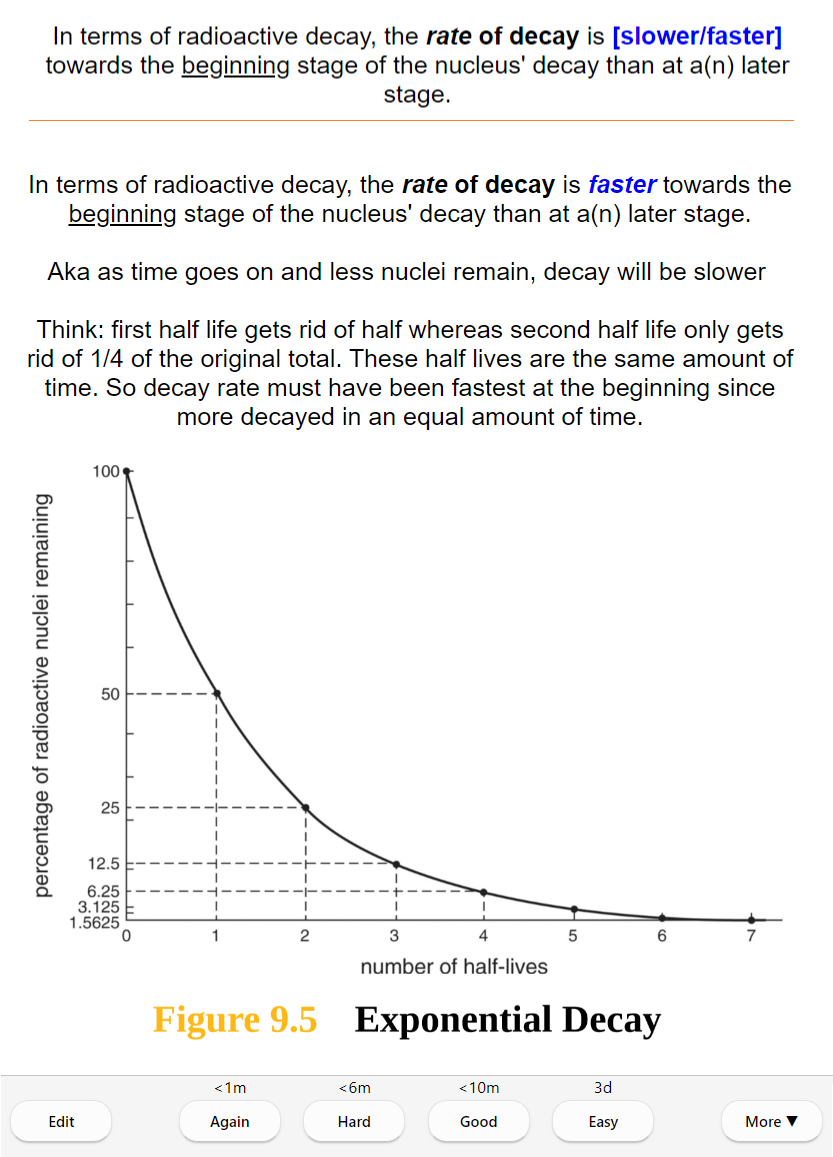
This deck is well-organized with hierarchical tags, allowing focused study on specific topics. It heavily uses fill‑in‑the-blank (cloze) format, which helps students review material faster and promotes efficient memorization, compared to pure basic flashcards.
Bouras’s encyclopedic deck is known for its extensive content and detailed coverage, making it suitable for students looking for an all-in-one, in-depth study tool. However, the large volume of cards can be overwhelming and requires a significant time investment.
Overall, Bouras Anki deck is a treasure trove of curated content, excellent for dedicated students wanting comprehensive preparation, but it may be challenging for those short on study time or seeking a more streamlined deck.
Who it’s for: Very thorough studiers or those who want literally every fact in one place. If you don’t mind volume, this deck is a powerful MCAT resource. Pros
-
Highly comprehensive, offering broad MCAT coverage.
-
Organized with hierarchical tagging for focused, efficient study sessions.
-
Uses cloze deletion format that promotes active recall and faster memorization.
-
Includes detailed explanations and reasoning strategies to enhance understanding.
-
The level of detail is good for advanced students / high scorers.
Cons
-
Requires a significant time commitment to reach mastery.
-
Some users may find it complex to navigate without prior Anki experience.
How To Choose The Right MCAT Anki Deck For You
- Know your background and goals.
Are you already strong in science fundamentals, or are you struggling with content? If you have little foundation, a leaner high-yield deck (like MileDown or Ortho528) can teach you the essentials without getting lost in minutiae.
If you’ve already done content review and need extra depth, a more comprehensive deck (JackSparrow, Aidan, or Bouras) might pay dividends.
Reddit advice reflects this: as one commenter put it, “AnKing is super detailed, great if you have time. MileDown is solid if you want a more to-the-point deck”.
In other words, if you’re on a tight schedule or just starting out, you may prefer a smaller, focused deck. If you love volume and have months, the monster decks can be worth it.
- Consider your study timeline.
How far away is test day? With many months, you can tackle big decks gradually. If you have only a few weeks, stick to the essentials and do practice passages.
Remember: Anki is great for long-term recall, but the MCAT also tests critical thinking on new passages.
If you’re short on time, decks like MileDown or Ortho528 are often recommended as solid “bang-for-buck” reviews. If you’ve got half a year or more, you could work through Mr. Pankow or even add the Bouras deck, card by card.
- Match your learning style.
Visual learners will love decks like MileDown which uses tons of diagrams and images. Audio/video learners might benefit from decks like AnKing, that include Pixorize or Khan Academy links.
Readers/writers who prefer text may like JackSparrow’s heavy paragraphs (or even making cloze cards from them). Interactive learners should pick decks like Mr. Pankow that “teach” concepts rather than just quiz definitions.
For broader study planning, integrate Anki with MCAT study plan builders to create a comprehensive prep strategy. For detailed guidance on Anki settings, daily discipline, and avoiding common mistakes, see our guide to studying MCAT using Anki.
- Combine and customize as needed.
You don’t have to use just one deck. Many students mix and match by subject.
For example, you might use the Aidan deck for Biology/Biochemistry and use Mr. Pankow’s deck exclusively for Psych/Soc.
You can also suspend parts of a deck or adjust settings: e.g., unsuspend only the cards for topics you’re currently studying. If you find duplicate content between decks, disable one.
Use Anki’s tagging or deck hierarchy to organize a deck by topic or concept.
In short, feel free to tailor the decks: add your own cards for gaps in knowledge and remove what you already know.
Pro tip: if a deck uses cloze cards and you prefer question format, you can often change the card type or even create simple front/back cards yourself.
Maximizing Your MCAT Study Efficiency With Anki
Anki is a powerful study tool, but only when used wisely. Try to integrate it with your overall MCAT plan, not as an island.
Here are some tips:
- Schedule It Daily: Aim for consistency.
A common approach is to treat Anki like a daily commitment - for example, doing 20-30 new cards each day along with any due reviews.
It’s usually better to do a moderate number every day than to cram hundreds occasionally.
As JackWestin advises, Anki will “display flashcards for review only when you are about to forget their content”. This means doing your reviews each day keeps old material fresh without overwhelming you.
Anki’s spaced-repetition algorithm works best when you see cards just as you’re about to forget them, so daily reviews feed that process. Even on busy days, try to do some reviews; skipping days can lead to a huge backlog.
- Balance New Cards Vs. Reviews: Don’t go overboard on new cards.
It’s tempting to crank through a massive deck, but overloading yourself leads to burnout.
For example, even if a deck has thousands of cards, completing 100 new cards per day is usually unsustainable. Starting with around 20–30 new cards daily is often recommended.
You’ll also spend significant time on reviews; this is good, because repetition cements memory, but it can eat up hours if mismanaged. Adjust the new-card limit based on how long it takes you each day.
Remember, as one guide warns, spending all your study time on Anki can backfire - “dedication to reviewing [can] sacrifice study time focused on question practice or learning new material”.
Make sure reviewing flashcards doesn’t replace doing new practice questions or reading new content.
- Integrate With Practice: Use Anki in tandem with other study work.
After studying a chapter or doing some practice problems, review the corresponding Anki cards.
For instance, if you finish the renal chapter in your review text, go through the related Anki subdeck. When you do practice passages and see a weakness, make a new Anki card for it.
Anki is most effective alongside active problem-solving. You must first ensure you understand the concepts from official sources, and aim for actual practice in parallel with your Anki.
In other words, practice problems teach you how to apply facts, and Anki helps you remember those facts. Don’t rely on memorizing cards alone as your entire strategy.
For subject-specific strategies, combine Anki with proven MCAT physics study strategies for optimal concept retention.
- Stay Engaged And Avoid Burnout: Anki can feel rote after hours of reviewing.
Try to keep it fresh: if possible, shuffle decks or intermix subjects to avoid monotony, and make use of tags (e.g., mark certain cards as “difficult” to review again soon).
When you feel frustrated or bored, switch briefly to a deck you know well just to rack up easy correct answers for confidence, or take short breaks. Some students even stand/walk while doing reviews to stay alert.
Importantly, keep reminders of your progress: every correctly answered card is a victory toward that long-term recall.
- Be Mindful Of Pitfalls.
Common traps include clicking “Again” on everything and not actively thinking about answers, or turning Anki into passive reading (especially a risk with heavy decks like JackSparrow).
Always try to recall the answer yourself before revealing the back of the card. If a card is consistently too hard, it’s better to break it into simpler parts or add mnemonic images (Anki’s image occlusion add-on can help for anatomy/biochem).
Also, watch your Anki settings (suspend cards you don’t need, adjust new
ratios, etc.).
Finally, don’t let Anki hog all your time - schedule in dedicated hours for practice tests, section banks, and content review outside of flashcards.
As mentioned above, one drawback is that without self-discipline, an over-reliance on Anki can come at the expense of other activities. Keep sight of your overall MCAT study goals.
Bottom Line:
By choosing the right Anki deck(s) and using them smartly, you can leverage spaced repetition to lock in the massive MCAT content load.
Whether you use MileDown for quick reviews or a mega-deck like AnKing/JackSparrow for depth, the key is consistency and integration.
As one Redditor put it: if you have extra time, start with the detailed decks; if not, go lean and focus on practice.
Stay consistent, supplement flashcards with active practice, and your MCAT study (and score!) will thank you.
For complementary study approaches, explore MCAT CARS study methods to build critical reasoning alongside memorization.
Written by
Dr. Sarah Johnson
Last updated 10/6/2025
